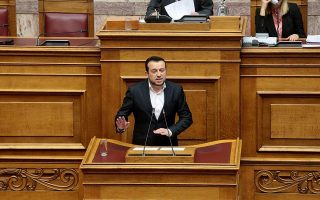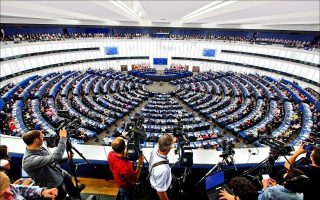PM comes unstuck over Macedonia, austerity in European vote

Greek Prime Minister Alexis Tsipras was left struggling for his political survival on Monday after his SYRIZA party, stung by austerity and a bitter rift over an accord with North Macedonia, got hammered in European Parliament elections.
Leftist SYRIZA, which stormed the Greek political stage in 2015 on the back of a popular backlash against painful economic reforms, suffered its first major defeat in years to the opposition conservative New Democracy party.
Smarting from the fallout, Tsipras said he would call snap elections, as New Democracy promptly demanded his resignation saying he no longer had a popular mandate. By law, the earliest the country could call elections is June 30.
“Basically people were tired of the same people in power,” said political analyst Theodore Couloumbis.
Results from the European elections show the Conservatives at least 10 points ahead, triggering a declaration from Tsipras on Sunday night that he would call snap elections.
Still, he is the longest serving Greek prime minister since the country lurched from crisis to crisis from the onset of financial turmoil in 2010, meaning that while he was now down, he was not a spent force, Couloumbis said.
“[SYRIZA] will still remain at the forefront as the second-largest party,” he said.
Another analyst, pollster Costas Panagopoulos from ALCO Research, said political parties that do well in European Parliament elections would do better in the national vote, meaning a projection of victory for New Democracy.
Once a leftist firebrand, Tsipras, 44, built his career as the crowd-pleaser who stood up to creditors and their austerity demands. But he was forced into a painful new bailout months later, when Greece was confronted with a choice of that or being turfed out of the euro zone.
U-turn
His U-turn went down badly with many voters. A subsequent, deeply unpopular agreement that resolved a long-running country name dispute with North Macedonia also upset many Greek voters.
Tsipras signed the so-called Prespes accord last year agreeing to a name change for its Balkan neighbor, resolving a decades-old wrangle which kept Macedonia out of the European Union and NATO. But for many Greeks, it was an unacceptable national defeat and an appropriation of Greek national heritage.
A former associate said the Prespes accord was Tsipras’ nemesis. “It was probably one of the most important factors [in the European election outcome],” the former associate said on condition of anonymity.
“The bailout period was also compressed, packed in to four and a half years which was like a decade [for voters]. People had a lot of pent-up frustration which they didn’t have an opportunity to vent at the ballot box before.”
Greece emerged from close economic supervision by creditors in August 2018, and Tsipras’s administration has since unwound some austerity with steps such offering pensioners additional bonuses and cutting sales tax.
But it was not enough, Couloumbis said. “People are tired of this government, and its last-minute move to buy the votes of people who have really suffered from this [crisis].”
SYRIZA’s loss to New Democracy in the European elections sent Greek government bond yields to record lows on Monday with the yield on bench mark 10 year government paper falling below 3.0 percent.
[Reuters]





